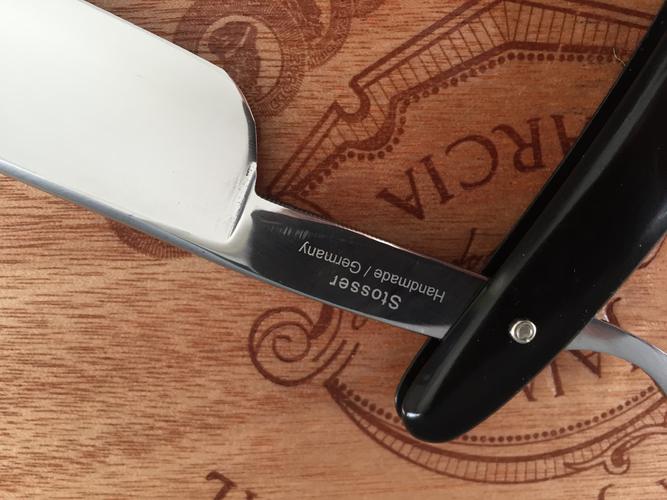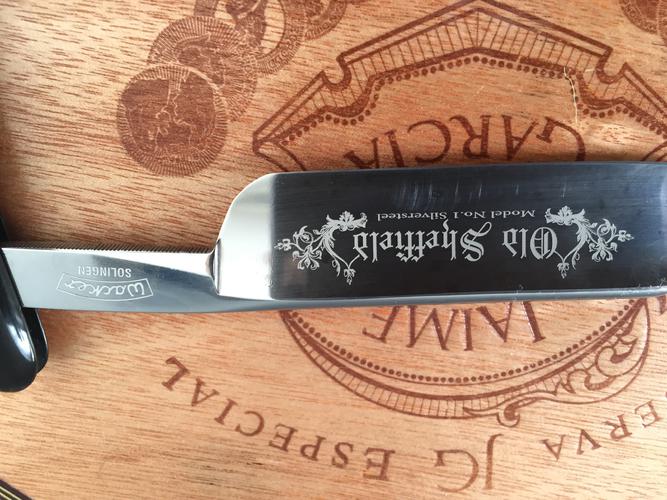Results 1 to 10 of 46
Thread: Is my near-wedge a near-wedge?
Hybrid View
-
02-27-2015, 10:03 PM #1

I don't think so. I know "Keilschliff" translates to "wedge cut" in English. "Stosser" is, I think the transliteration of "Stoßer," which means something like "piercing" or "pushing." I should probably ask my German brother-in-law to give me an official translation. But that would mean actually talking to him. :|
~Rob~
-
02-28-2015, 08:46 AM #2


Rob,
No need to call the brother-in-law , they both mean wedge:
, they both mean wedge:
- Keilschliff = literal translation
- Stosser = old tradename that became synonymous with 'wedge' and which was/is used by many razor makers: Tuckmar Stosser, Schulze Stosser, Wacker Stosser etc They're all Keilschliffs.Last edited by MichaelS; 02-28-2015 at 09:55 AM. Reason: typo
-
02-28-2015, 12:46 PM #3
-
02-28-2015, 04:24 PM #4Senior Member



- Join Date
- Apr 2008
- Location
- Essex, UK
- Posts
- 3,816
Thanked: 3164
I dont think so, I mean that the blanks were just that, blank razor shaped bits of steel, either hand forged or pressed out of a sheet with a tilt hammer, untempered, and very thick to allow for subsequent grinding.
The sides would be thick enough to allow for most types of grinding, so it would be useless to add any marking at this stage, as it would be ground off again.
Cant tell from the photo, but the blade markings look laser etched or something similar, and this would be appled as one of the last stages in production.
Regards,
Neil
-
02-28-2015, 07:04 PM #5

You're right -- all markings on the blade are etched, not stamped. So they must have been applied after grinding:


Which leaves me somewhat baffled as to why the back of the tang is marked "Stosser" if, indeed, Stosser is a trade name for wedge.
Edit: I'm also baffled as to why my photos are attached upside down.Last edited by CtwoHsix0h; 02-28-2015 at 07:06 PM. Reason: Upside down photos
~Rob~
-
02-28-2015, 07:30 PM #6Senior Member



- Join Date
- Apr 2008
- Location
- Essex, UK
- Posts
- 3,816
Thanked: 3164
My Heartring Stosser is a quarter hollow - nowhere near a wedge.
And I can't find a literal definition of Keilschliff online"?
Regards,
NeilLast edited by Neil Miller; 02-28-2015 at 07:40 PM.
-
02-28-2015, 07:51 PM #7

Keil is German for "wedge" and Schliff means "cut." It's a literal translation from German to English.
What I still have trouble identifying is Stosser. I think it translates to something like "sharp" or "piercing," but the post from MichaelS above suggests it's a trade name.~Rob~
-
02-28-2015, 08:15 PM #8Senior Member



- Join Date
- Apr 2008
- Location
- Essex, UK
- Posts
- 3,816
Thanked: 3164
You are correct Rob. I still cannot get an online translation of 'keilscliff' but I forget the germans have an inconvenient habit of tagging words together, so I tried 'keil schliff' and got back wedge type.
I also found a reference to it in a german-written book about WW! dated 1917:
Es war in handarbeit aus Bestens Stahl gefertigt und verfugte uber einen franzosischen Keilschlif, der bestens geeignet war, feiner Konturen des Bartes herauszuarbeiten.
The babelfish translation is not too helpful:
It was in handmade from fine steel and shops about a French Keilschlif who was ideally suited, to elaborate fine contours of the beard. (English)
I still have difficulty seeing 'stosser' as a tradename - it seems to me to be a 'type' rather than a tradename.
I also have difficulty in seeing a wedge being useful for fine contours - surely a full hollow would be more suited? Perhaps the babel translation is throwing a spanner in the works and we need someone proficient in German and English to help out.
Stosser (and its two other main variant spellings) also comes up time after time as 'sharp', 'thrusting', 'piercing', and 'ramming'. But it aslo has another meaning, and that is a geological one, meaning the step sides of a hill. Another reference is to be found in wartime, this time WW2. The germans, in the Battle of the Bulge, attempted a parachute operation called Operation Stosser - the meaning hear must refer to the hill.
Maddening, isn't it?
Regards,
Neil
Regards,
Neil
-
02-28-2015, 08:35 PM #9

That's interesting. You wouldn't really think of a wedge in that way would you?
As for Keilschliff, Google translate spits out "wedge cut": https://translate.google.com/#de/en/keilschliff
My two cents (or pence, for those of you in the UK) on Operation Stosser is that it could work equally well with the thrusting, piercing or pushing definition. You'll recall that the Battle of the Somme in WWI was referred to as "The Big Push" -- it was an operation that was intended to push through the entrenched German lines and on to Berlin. I could see the Germans using that term to label an operation that dropped paratroops behind the enemy -- penetrating their line. Just speculation, of course.
But, yes, it is rather maddening.~Rob~
-
02-28-2015, 09:35 PM #10Senior Member



- Join Date
- Apr 2008
- Location
- Essex, UK
- Posts
- 3,816
Thanked: 3164


 73Likes
73Likes LinkBack URL
LinkBack URL About LinkBacks
About LinkBacks







 Reply With Quote
Reply With Quote I wonder if Stosser was pre-printed on the blank that Herr Wacker acquired, then he decided to grind it hollow?
I wonder if Stosser was pre-printed on the blank that Herr Wacker acquired, then he decided to grind it hollow?
